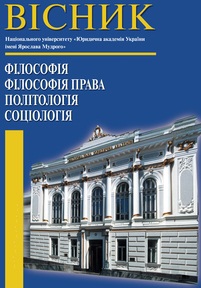ПРАВО ЯК НОРМАТИВНА СИСТЕМА:
«ГУМАНІСТИЧНИЙ» ПОЗИТИВІЗМ ЄВГЕНІЯ БУЛИГІНА
LAW AS A NORMATIVE SYSTEM: EUGENIO BULYGIN’S «HUMANISTIC» POSITIVISM
Author(s): Sergiy Ivanovych MaksymovSubject(s): Logic, Ethics / Practical Philosophy, Philosophy of Law
Published by: Національний юридичний університет імені Ярослава Мудрого
Keywords: Eugenio Bulygin; normative systems; deontological logic; law; legal positivism; law and morality; justification of human rights; «humanistic» positivism;
Summary/Abstract: Problem setting. Certain ’stereotyped’ representations of legal positivism as a ’rigid’ concept of law that ignores a person as a creative subject and requires only a clear obedience to normative requirements are refuted by an example of the theoretical views of the outstanding Argentine philosopher of law Eugenio Bulygin, who was born in the early 30’s years of the twentieth century in Kharkiv.Recent research and publications analysis. Creativity of E. Bulygin in recent times was a subject of quite many publications, made as by representatives of the Western philosophy of law, as well as post-Soviet researchers. At the same time, the analysis of the main moments of life and scientific activity of the outstanding scientist in terms of identifying a certain humanistic bias of his philosophical and legal creativity is carried out for the first time.Paper objective. The purpose of the article is to demonstrate the main points of life and work of E. Bulygin in the context of his main positivist idea of law as a normative system with a humanistic dimension.Paper main body. The article gives an overview of the main life stages of the Argentine philosopher of law, which influenced the formation of his scientific outlook: school, university, creative collaboration with Carlos Alchourron, internship with Herbert Hart at Oxford University, multifaceted scholarly and teaching activity at the University of Buenos Aires and other universities of the world. His fruitful activities in the International Association of Philosophy of Law and Social Philosophy is especially distinguished.Particular attention is paid to his main work, ’Normative Systems’, written in co-authorship with K. Alchurron. An analysis of the main points of this work, such as the rules and logical structure of legal sentences, the inapplicability of the concepts of truth to legal norms, the problem of gaps in law, etc., is given.It is also revealed the peculiarities of views on the relation of law and morality as different spheres of human activity, but emphasizes the possibility, in some cases, of favoring a moral solution to legal prohibitions.Conclusions of the research. According to E. Bulygin, the consideration of law as a normative system greatly extends the horizons of its logical analysis, while at the same time envisaging taking into account the activity of a person as a subject of law, whose moral position may prevail over formal norms in the context of both judicial law-making and the justification of human rights as a unique experience, which should be kept. Thus, the humanistic dimension of law finds its realization.
Journal: Вісник НЮУ імені Ярослава Мудрого. Серія: Філософія, філософія права, політологія, соціологія
- Issue Year: 38/2018
- Issue No: 3
- Page Range: 53-66
- Page Count: 14
- Language: Ukrainian

